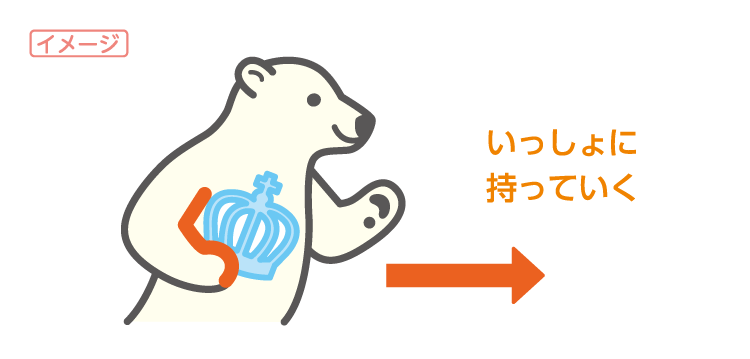❶(手に)取る, つかむ; (手に取って)持って行く, 連れて行く
反対語bring (持って[連れて]来る)
take a card
♔基本take a card
トランプの札を1枚取る
⦣ take+名詞.
take up the receiver
take up the receiver
受話器を取り上げる
Take my hand. We'll cross the street together.
Take my hand. We'll cross the street together.
私の手を取って[手につかまって]. いっしょに道を渡わたろう.
take lunch to school
take lunch to school
学校へ弁当を持って行く
Daddy will take me to the ball game.
Daddy will take me to the ball game.
パパが僕ぼくを野球の試合に連れて行ってくれる.
Take an umbrella with you.
Take an umbrella with you.
傘かさを持って行きなさい.
He takes his dog for a walk every morning.
He takes his dog for a walk every morning.
彼は毎朝犬を散歩に連れて行く.
The mother took the baby in her arms.
The mother took the baby in her arms.
母親は両腕りょううでに赤ん坊ぼうを抱だき上げた.
The teacher took the comic book away from me.
The teacher took the comic book away from me.
先生は漫画まんがの本を私から取り上げた.
He took me home in his car.
He took me home in his car.
彼は車で私を家まで送ってくれた.
⦣ home は副詞で「家へ」.
Who has taken my bicycle?
Who has taken my bicycle?
誰だれが僕の自転車を持ってったんだ[自転車をとったのは誰だ].
⦣ 現在完了かんりょうの文. have助動❶
When African people were taken to America, they took their songs and dances with them.
When African people were taken to America, they took their songs and dances with them.
アフリカ人はアメリカへ連れて行かれた時自分たちの歌と踊おどりをいっしょに持って行った.
⦣ were taken は受け身形. were助動❷
We are taking some sandwiches and Coke on our picnic.
We are taking some sandwiches and Coke on our picnic.
私たちはピクニックにサンドイッチとコーラを持って行きます.
⦣ 「近い未来」を示す現在進行形の文. are助動❶
❷受け取る, もらう; 勝ち取る; 捕とらえる, 捕つかまえる; (力ずくで)奪うばい取る ⦣ いずれも「自分の物にする」ことを表す.
He gives me money and takes the cloth.
反対語He gives me money and takes the cloth.
彼は私にお金を与あたえ, その布を受け取ります.
He didn't take my advice.
He didn't take my advice.
彼は私の忠告を取り入れなかった.
He took first prize in the flower show.
He took first prize in the flower show.
彼は花の品評会で1等を取った.
Our team took the first game and lost the second.
反対語Our team took the first game and lost the second.
わがチームは第1ゲームを取り, 第2ゲームを落とした.
*会話*
Hello. Can I take your order?—Yes, I'd like two double cheeseburgers and one orange juice, please.
いらっしゃいませ. ご注文は何になさいますか.—ダブルチーズバーガー2つとオレンジジュース1つください.
❸交通手段としてとる(乗り物に)乗る, ~に乗って行く, 使う; (道・コースを)とって行く
take a bus [a taxi, a train]
take a bus [a taxi, a train]
バス[タクシー, 電車]に乗る
take a bus home from work
take a bus home from work
職場からバスで家に帰る
⦣ home は副詞で「家へ」.
I always take a bus to school.
I always take a bus to school.
私はいつも学校へバスで行きます.
He took a short cut home.
He took a short cut home.
彼は近道をして家に帰った.
❹(時間・労力などを)とる, 必要とする (need); (時間が)かかる
take (a long) time
take (a long) time
(長い)時間がかかる
The task took us two hours.=We took two hours to complete the task.
The task took us two hours.=We took two hours to complete the task.
(その仕事は私たちにとって 2 時間とった)その仕事をするのに私たちは 2 時間かかった.
Take your time.
Take your time.
ゆっくり時間をかけてやりなさい.
It takes five eggs to make this cake.
It takes five eggs to make this cake.
このケーキを作るには卵が5個必要です.
⦣ It=to make 以下. to❾の①
It took four men to carry the stone.
It took four men to carry the stone.
その石を運ぶのに4人の男が必要だった.
It takes (me) only five minutes to walk there.
It takes (me) only five minutes to walk there.
そこへ歩いていくのに(私にとって) 5分しかかからない.
⦣ It は漠然ばくぜんと「時間」を表すと考えてもよいし, It=to walk (歩いていくこと)以下と考えてもよい.
How long does it take to get to school by bus?
How long does it take to get to school by bus?
バスで学校へ行くのにどのくらいかかりますか.
❺(新聞などを定期的に)とる, (席などを)予約して取る, (部屋などを短期間)借りる; (品物を選んで)買う; (例として)取り上げる
I'll take this one [it].
I'll take this one [it].
(店で)これ[それ]を買います.
We take two newspapers.
We take two newspapers.
うちは新聞を2紙とっている.
We took a cottage at the beach for the summer.
We took a cottage at the beach for the summer.
私たちは夏を過ごすために海辺の別荘べっそうを借りた.
Take the population, for example.
Take the population, for example.
たとえば人口問題を取り上げてみよう.
❻(写真・コピー・記録などを)とる, 書き取る; (寸法・脈などを)とる
take a video
take a video
ビデオをとる
take a picture of ~
take a picture of ~
~の写真を撮とる
take a copy of ~
take a copy of ~
~のコピーをとる
Take my picture with this camera.
Take my picture with this camera.
このカメラで僕の写真を撮ってよ.
This is a famous picture taken in the Meiji era.
This is a famous picture taken in the Meiji era.
これは明治時代に撮られた有名な写真です.
⦣ 過去分詞 taken (撮られた~)は picture を修飾しゅうしょくする.
The police officer took (down) the number of our car.
The police officer took (down) the number of our car.
警官は私たちの車のナンバーを書き留めた.
The nurse took my temperature.
The nurse took my temperature.
看護師は私の体温を計った.
⓫take A from B で BからAを取る
If you take 4 (away) from 10, you have [get] 6.
If you take 4 (away) from 10, you have [get] 6.
10から4を取れば[引けば]6が残る.
The book takes its title from the Bible.
The book takes its title from the Bible.
その本は書名を聖書から取っている.
⓬(人の言葉などを)(悪く[良く])とる; (~と)受け取る[考える]
take his words badly [well, seriously]
take his words badly [well, seriously]
彼の言葉を悪く[良く, 真面目に]とる[解釈かいしゃくする]
